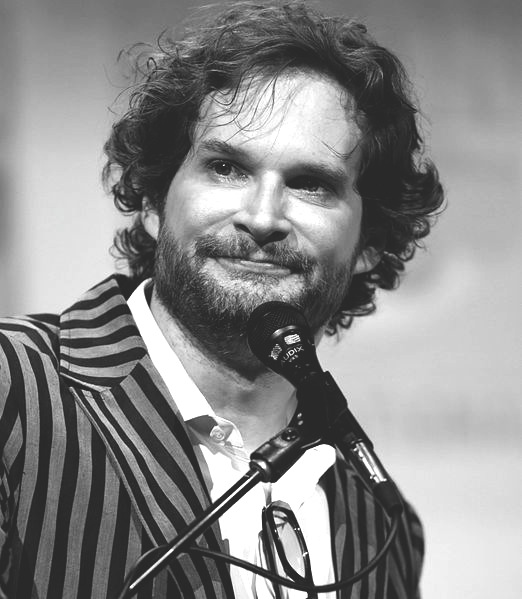

Photos courtesy of Wikimedia Commons
Neil Gaiman, left, and Bryan Fuller, right, are executive producers of the new “American Gods” TV adaptation.
BY RENN ELKINS ’20
It’s no secret within the realm of fantasy devotees that the upcoming television adaptation of Neil Gaiman’s novel “American Gods” is the most anticipated page-to-screen adaptation of darkly humored contemporary mythology since, well, “Percy Jackson and the Olympians.” With a production crew consisting of executive producers Michael Green (“Heroes,” “Kings”), Bryan Fuller (“Hannibal,” “Pushing Daisies”) and, of course, Gaiman himself, the anticipation is well-deserved — and, unlike in the case of 2010’s tragic butchering of Rick Riordan’s YA novel, the buildup is nearly guaranteed to culminate in a piece of television that actually does justice to its source material.
What suggests that “American Gods” will be good? For a start, there’s the trailer. The one-minute and fifty-five seconds of growling dialogue, darkly metallic filtering, and no small amount of lightning effects is enough to bring any Gaiman fan’s stomach to a boil of excitement. Vast landscape shots, overlaid with a twangy soundtrack reminiscent of old Westerns, promise the rich atmosphere of Americana that the novel so perfectly conveyed — but that’s not to say that cultural representation will be limited.
“American Gods” the book is a brilliant conglomerate of mythology from all across the world, taking advantage of the United States as a hotbed of acculturation. Interviews suggest that the TV series will stay true to this diversity. So far, the creative team seems to be steering clear of the plague of whitewashing that’s been dominating far too much popular media lately (“Star Trek,” “Doctor Strange,” “Gods of Egypt” ... the list goes on). As Bryan Fuller told Variety magazine, Gaiman has been largely at the helm of ensuring the racial accuracy of the adaptation.
These measures he’s taken include mandating that protagonist Shadow Moon be cast as a man of color. “In order to be true to the book, you had to cast the character who was written, who is not white,” Fuller said. According to Fuller, Gaiman’s creative influence also played a part in the showrunners refusing to accept harmful, appropriative colorblind casting, such as a black actor in the role of an Indian character.
This promise of both accuracy and inclusion would be reason enough to start getting excited about American Gods, but there’s more good news to come: according to Nerdist, as layered and action-packed as Gaiman’s original novel may be, Fuller and Green aren’t shying away from expanding upon it. From the way the showrunners talk, it sounds like we have at least three seasons to look forward to, and that means there’s a lot of filler to be had — but, when that filler is promised to consist of the flashback-style ‘coming to America’ stories of the novel’s myriad gods, likely including Kristen Chenoweth’s Easter, Orlando Jones’s Mr. Nancy, and Peter Stormare’s Czernobog, it’s hardly cause for complaint.
According to Nerdist, Fuller and Green will ensure that extensive screen time be allotted to fleshing out Mad Sweeney, the ill-fated leprechaun who inadvertently sets so much of Shadow’s story in motion. And, perhaps most promising of all, they’ll be expanding upon the roles of women: Fuller observed that the novel is “very much a sausage party,” and hopes to change that in the series. It’s true that, while many female characters are introduced in the novel, only a couple of them have their own complete arcs: the biblical Bilquis, the mysterious Zorya Sisters and even the seemingly human Samantha Black Crow are all teeming with undiscovered potential, which the show’s production crew seems more than eager to unlock.
This is a notion fully supported by Gaiman himself, who seems more than happy with the way the series is coming along so far. In an interview with online publication Observer, he described his participation in the process as that of a fact-checker more than anything else. According to Gaiman, Fuller and Green present him with material, he comments on any disparity between his vision and theirs, and the team fixes things accordingly.
As any dedicated fan of the novel may testify, this guarantee of faithfulness to Gaiman’s astounding imagination may be the most promising notion of them all.
Judging from the way that Gaiman talks — and tweets — fans of “American Gods” have a delicious, multifaceted, refreshingly diverse treat on its way to their screens. As for those who haven’t yet discovered the magic of the novel for them- selves, the time has never been better. This whirlwind of a book is overflowing with magic, myth, blood, tears and wicked humor — not to mention seamless incorporation of the whole wide world’s ancient deities into the shamelessly gritty reality of contemporary America. What are you waiting for?
